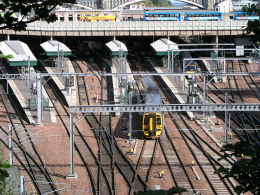Posted 17th November 2011 | 5 Comments
Scottish proposals branded 'Alice in Wonderland'

One proposal is that Edinburgh would be the terminus of trains from England
A SET of proposals from Transport Scotland which could see the end of through trains between England and Scotland north of the central belt as well as a ban on alcohol and a reduction in sleeper services has been branded as 'Alice in Wonderland' by furious critics. But the Scottish Government is pointing out that the proposals are only at the consultation stage.
Transport Scotland is starting to plan the shape of the country's rail services after the present ScotRail franchise ends in 2014. It is asking whether there should be more than one franchise, to operate different types of passenger services, and also asking for views on whether the Caledonian Sleeper services should be run separately.
Another suggestion is that services from England should not run north of the central belt, because Transport Scotland believes that through trains from the East Coast Main Line to Aberdeen and Inverness are abstracting revenue from ScotRail.
But a furious backlash emerged only hours after the consultation document appeared. The Scottish Government has been quick to point out that the ideas are only being published for the purposes of starting a debate on how the country's railways should be developed, although Transport Scotland says farepayers are only contributing 26 per cent of the cost of running ScotRail, and makes it clear that the government wants to reduce the amount of public expenditure on the system.
As criticism mounted, an official spokesman at Holyrood insisted that the plans were only part of an open consultation, and did not 'represent ministerial thinking'. Transport Scotland added: "The range of questions and options in the consultation does not reflect the position of ministers precisely because it is a consultation, and competing options are suggested on different points, such as sleeper services."
But the critics have not been reassured. Labour transport spokesman Lewis Macdonald said: "It’s absolute Alice in Wonderland stuff. They’ve put out a consultation full of crackpot ideas, everyone responding has said you must be off your trolley and now they’re trying to pretend it’s not them after all. It’s pure fantasy.”
There is some time yet for responses to be sent to Transport Scotland, which is keeping the consultation open until February.
Reader Comments:
Views expressed in submitted comments are that of the author, and not necessarily shared by Railnews.

John Gilbert, Cradley, Herefordshire, England
But the trouble with this Privatisation was that it was decided upon purely as politican dogma by people who were less than capable of introducing it. Just political dogma to muck up the country's rail system and to hell with the consequences. Remember that even Margaret Thatcher steered clear of rail privatisation, and John Major, the arch-culprit, thought the present system idiotic and wanted a return to the Big Four. A country gets the politicians it deserves - so that means it's all our fault then! Think on these things.
Philip Russell, Carlisle, United Kingdom
It seems we have not made much progress in the 200 years of being the worlds inventor of modern railways if the only reason we can come up with for withdrawing popular cross border inter city trains is not being able to work out how to divide the revenue,Privitisation sounded good in theory 20 years ago but the passage of time has taught us British Rail rail could have achieved almost as much at a lot less cost .
Lutz, London
The 'Alice in Wonderland' jibe would seem to be intended to engender criticism of the proposals without having any grounds for the comment, or an alternative argument.
The Scottish Government needs to live within its means, and increasing the fare payers contributions from 26% is the first step. The proposals are not that radical, and make good operational sense, but what is not said is that many services in Scotland are financial untenable; in essence parts of the railway north of the boarder have no purpose other than political nice to have.
H Harvey, Birmingham
Farepayers only paying 26% of costs. Just how much of cost of roads does car users pay. Ask that question.
'back of fag packet calculation'
Interesting study from Glaxo Klein identified provision of car parking cost the company £9600/annum. about £200/week or £40/day ie at least £2/hr.
On that basis each employee who came by car is avoiding paying tax of £2000/annum
Now a very high proportion of motorists use the footpath/highway as car park at work or overnight at home and are effectively getting a free ride at ratepayers or taxpayer expense. At a rough guess 2million of them producing a cost of £20billion
Add to this the number of motorists who do not pay road tax or insurance and cost of road accidents 3,000 deaths and 100,000 injured/annum.
Then add cost of traffic pollution and wec have not even started to include the cost of road construction maintenance policing
Even assuming these figures ten times to high they show rail good value to tax payer at large.
PS to motorists: cigarrette smokers do not get free cigarrette lighters nor matches. Claims about motorists paying this and that tax is complete red herring. WE ALL PAY TAX. Except bankers
Gerry Bilsborough, Swindon, Wilts
What a load of rubbish who are these crack pots who think of these ideas are they on this planet?. Rail travel is for the people of England Scotland and Wales who wish to travel without too many changes of trains. Imagine an elderly couple travelling on holiday to the Highlands of Scotland with luggage what are they going to say (we may as well holiday some where else than Scotland if there will be no through services, and that will not do much for the Scottish holiday trade. These people want to get a life, next some crack pot will think of introducing passport control?